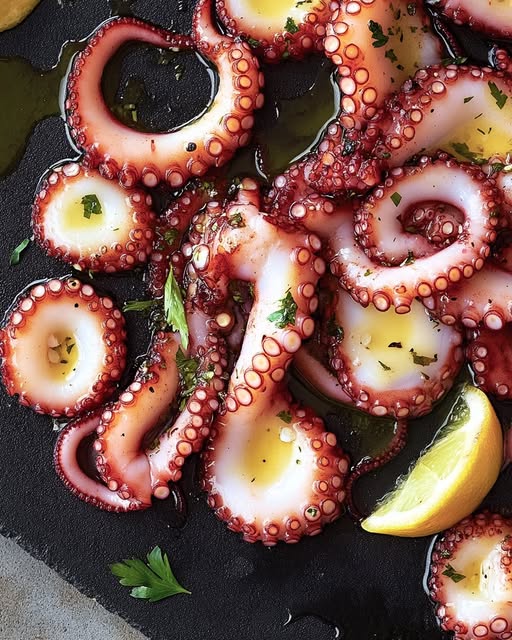Why You’ll Fall in Love with Marinated Octopus Delight
Picture this: a lazy Sunday afternoon, the smell of garlic wafting through your kitchen, and a dish so vibrant it practically sings on your plate. That’s what happened when I first made **Marinated Octopus Delight**. It was love at first bite. The tender octopus, tangy marinade, and zesty lemon hit all the right notes. This recipe is more than just food—it’s an experience that brings people together. Whether you’re cooking for family or hosting a dinner party, this dish will leave everyone talking.
The Story Behind Marinated Octopus Delight
I discovered this dish during a trip to Greece, where octopus is king. Grilled, marinated, or stewed, it’s everywhere. But there’s something magical about marinating octopus. The blend of vinegar, garlic, and olive oil creates a flavor profile that’s both bold and comforting. Back home, I tweaked the recipe to suit my taste buds, adding a touch of dried oregano for extra flair. Over time, it became a staple at my gatherings—a dish that feels both fancy and familiar.
Why You’ll Love This Recipe
This **Marinated Octopus Delight** is a winner for so many reasons. First, it’s surprisingly easy to make. No need to be a culinary wizard—just follow the steps, and you’re golden. Second, the flavors are incredible. The tangy marinade softens the octopus while infusing it with depth. Lastly, it’s versatile. Serve it as an appetizer, a main course, or even part of a tapas spread. Trust me, once you try it, you’ll want to make it again and again.
Perfect Occasions to Prepare This Dish
This dish shines at casual get-togethers, summer barbecues, or holiday feasts. Imagine serving it at a Mediterranean-themed dinner party or as a show-stopping appetizer for Thanksgiving. It’s also perfect for date night—impress your partner with your culinary skills! Plus, it pairs beautifully with crisp white wine or sparkling water with lemon. Whatever the occasion, this dish will steal the spotlight.
Ingredients for Marinated Octopus Delight
- 1.8 kg (4 pounds) of fresh octopus
- 8 cloves of garlic, finely sliced
- 600 ml (2.5 cups) of red wine vinegar
- 600 ml (2.5 cups) of water
- A drizzle of extra virgin olive oil
- A pinch of dried oregano
- Lemon wedges for serving
Substitution Options
If you can’t find fresh octopus, frozen works just as well—just thaw it beforehand. Swap red wine vinegar for white wine vinegar if needed. For a milder garlic flavor, roast the cloves before adding them to the marinade. And if you’re out of oregano, thyme or rosemary can step in. Feel free to experiment based on what’s in your pantry!
Step 1: Preparing the Octopus
Start by giving your octopus some TLC. With a sharp knife, separate the tentacles from the head and body. Cut the head into smaller pieces. This might feel intimidating at first, but trust me, it’s easier than it looks. Pro tip: If your octopus has a beak, remove it—it’s usually located where the tentacles meet the head. Rinse everything thoroughly under cold water to ensure it’s clean and ready for cooking.
Step 2: Cooking the Octopus
Place the octopus in a large pot and cover it with water. Bring it to a boil over high heat, then reduce to medium and let it simmer. The aroma will start filling your kitchen, and you’ll know you’re on the right track. Let it cook for 1 to 2 hours, checking periodically for tenderness. A perfectly cooked octopus should feel soft yet firm—not rubbery. Patience is key here!
Step 3: Checking for Tenderness
After an hour, test the octopus by tasting a small piece. Is it still chewy? Keep cooking in 30-minute intervals until it’s just right. Remember, every octopus is different, so don’t rush this step. Once it’s tender, drain the water and let the octopus cool slightly. Pro tip: Adding a splash of vinegar to the boiling water can help tenderize the octopus faster.
Step 4: Preparing the Marinade
Now comes the fun part—the marinade! Place the cooked octopus in a glass jar or bowl. Mix equal parts red wine vinegar and water, then pour the mixture over the octopus. Add the sliced garlic cloves for an extra punch of flavor. Let it sit at room temperature for 2 hours, allowing the marinade to work its magic. The result? A tangy, aromatic dish that’s bursting with personality.
Step 5: Serving Your Creation
When the marinating time is up, slice the tentacles into bite-sized pieces. Sprinkle with dried oregano, drizzle with extra virgin olive oil, and serve with lemon wedges on the side. The bright citrus adds a refreshing contrast to the rich flavors. Arrange everything on a platter for maximum wow factor. Chef’s tip: Garnish with fresh parsley for a pop of color.
Timing Breakdown
- Preparation Time: 15 minutes
- Cooking Time: 4 hours 15 minutes
- Total Time: 4 hours 30 minutes
While this dish requires patience, the end result is worth every minute. Plan ahead, and you’ll have a stunning dish ready to impress.
Chef’s Secret
Here’s a little secret: freezing the octopus before cooking can make it even more tender. Pop it in the freezer for a day or two, then thaw it before starting. This trick mimics the natural tenderizing process and ensures melt-in-your-mouth results.
Extra Info
Did you know octopus contains high levels of omega-3 fatty acids? These heart-healthy fats make it a nutritious choice for seafood lovers. Plus, it’s low in calories and packed with protein. So go ahead—enjoy this dish guilt-free!
Necessary Equipment
- A large pot for boiling
- A sharp knife for prep work
- A glass jar or bowl for marinating
- Tongs for handling the octopus
Simple tools, big flavors—that’s the beauty of this recipe.
Storage Tips
Store leftovers in an airtight container in the fridge for up to 3 days. The marinade keeps the octopus moist and flavorful, making it a great make-ahead option. To reheat, gently warm it in a skillet with a splash of olive oil. Avoid microwaving, as it can dry out the texture.
If you want to freeze the dish, skip the marinade step. Instead, freeze the cooked octopus separately. Thaw it overnight in the fridge before marinating and serving.
Pro tip: Label your containers with the date to keep track of freshness.
Tips and Advice
For best results, use fresh ingredients. Fresh garlic and high-quality olive oil elevate the dish significantly. Don’t skimp on the resting time—letting the octopus marinate ensures deep, layered flavors. And always taste as you go; adjust seasoning if needed.
Presentation Ideas
- Serve on a bed of arugula for a fresh twist.
- Add colorful cherry tomatoes for vibrancy.
- Use a rustic wooden board for a charming look.
Little touches make a big difference!
Healthier Alternatives
Looking to lighten up this dish? Try these variations:
- Baked Octopus: Roast the octopus instead of boiling for a smoky flavor.
- Herb-Infused Marinade: Replace vinegar with lemon juice and herbs like basil or mint.
- Grilled Octopus: Grill the cooked octopus for charred edges and added texture.
- Low-Sodium Option: Skip added salt and rely on natural flavors.
- Vegan Twist: Substitute mushrooms for octopus in the marinade.
- Spicy Kick: Add red pepper flakes to the marinade for heat.
Mistake 1: Skipping the Tenderness Test
One common error is assuming the octopus is done after the minimum cooking time. Every octopus is unique, and rushing this step can lead to rubbery results. Always test for tenderness to avoid disappointment. Pro tip: Use tongs to pull out a small piece for sampling.
Mistake 2: Over-Marinating
Leaving the octopus in the marinade too long can overpower its natural flavor. Stick to the recommended 2-hour window for balanced results. If you prefer stronger flavors, adjust the vinegar-to-water ratio instead.
Mistake 3: Using Low-Quality Ingredients
Cheap vinegar or old spices can ruin the dish. Invest in good-quality ingredients—they truly make a difference. Fresh garlic, premium olive oil, and fragrant oregano are non-negotiables here.
Mistake 4: Neglecting Resting Time
Rushing the resting period means missing out on flavor development. Give the octopus ample time to absorb the marinade for maximum impact. Patience pays off!
Mistake 5: Improper Storage
Storing leftovers improperly can spoil the dish. Always use airtight containers and refrigerate promptly. Reheat gently to preserve texture and taste.
FAQ: Can I Use Frozen Octopus?
Absolutely! Frozen octopus is widely available and often pre-cleaned, saving you prep time. Just thaw it completely before cooking.
FAQ: How Do I Know When the Octopus Is Done?
Test by tasting a small piece. It should be tender but not mushy. If it feels tough, continue cooking in 30-minute increments.
FAQ: Can I Make This Dish Ahead of Time?
Yes! In fact, preparing it a day in advance allows flavors to meld. Store in the fridge and bring to room temperature before serving.
FAQ: What Should I Serve with This Dish?
Pair it with crusty bread, a green salad, or roasted vegetables. For drinks, opt for crisp white wine or sparkling water with lemon.
FAQ: Is This Dish Spicy?
Not inherently, but you can add chili flakes or hot sauce to the marinade for heat. Customize it to your liking!
FAQ: Can I Grill the Octopus After Marinating?
Definitely! Grilling adds a smoky dimension that complements the marinade beautifully. Just brush with olive oil to prevent sticking.
FAQ: How Long Does the Dish Last in the Fridge?
Stored properly, it lasts up to 3 days. Always check for signs of spoilage before consuming.
FAQ: Can I Use Other Types of Vinegar?
Red wine vinegar is ideal, but white wine or apple cider vinegar works too. Avoid balsamic, as it’s too sweet and thick.
FAQ: Is This Recipe Gluten-Free?
Yes! All ingredients are naturally gluten-free, making it a safe choice for dietary restrictions.
FAQ: Can I Double the Recipe?
Of course! Simply double the quantities and use a larger pot for cooking. Perfect for feeding a crowd.
FAQ: Why Does My Octopus Smell Fishy?
Fresh octopus shouldn’t have a strong odor. If yours does, rinse it thoroughly and soak it in milk for 30 minutes before cooking to neutralize the smell.
In conclusion, **Marinated Octopus Delight** is a dish that combines simplicity, bold flavors, and versatility. Whether you’re a seasoned cook or a beginner, this recipe is sure to become a favorite. So grab your apron, invite some friends over, and let the magic unfold. Bon appétit!

Marinated Octopus Delight
Ingredients
Equipment
Method
- Separate the tentacles from the head of the octopus and cut the head into smaller pieces, rinsing everything thoroughly under cold water.
- Place the octopus in a large pot, cover it with water, and bring it to a boil over high heat.
- Reduce the heat to medium and let the octopus simmer for 1 to 2 hours, checking periodically for tenderness.
- After an hour, taste a small piece to check for chewiness; continue cooking until tender, then drain and let cool slightly.
- Place the cooked octopus in a glass jar or bowl and mix equal parts red wine vinegar and water to pour over it.
- Add the sliced garlic cloves to the octopus and let it sit at room temperature for 2 hours.
- After marinating, slice the tentacles into bite-sized pieces, sprinkle with dried oregano, drizzle with olive oil, and serve with lemon wedges.
